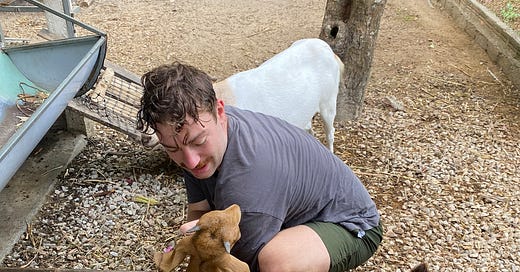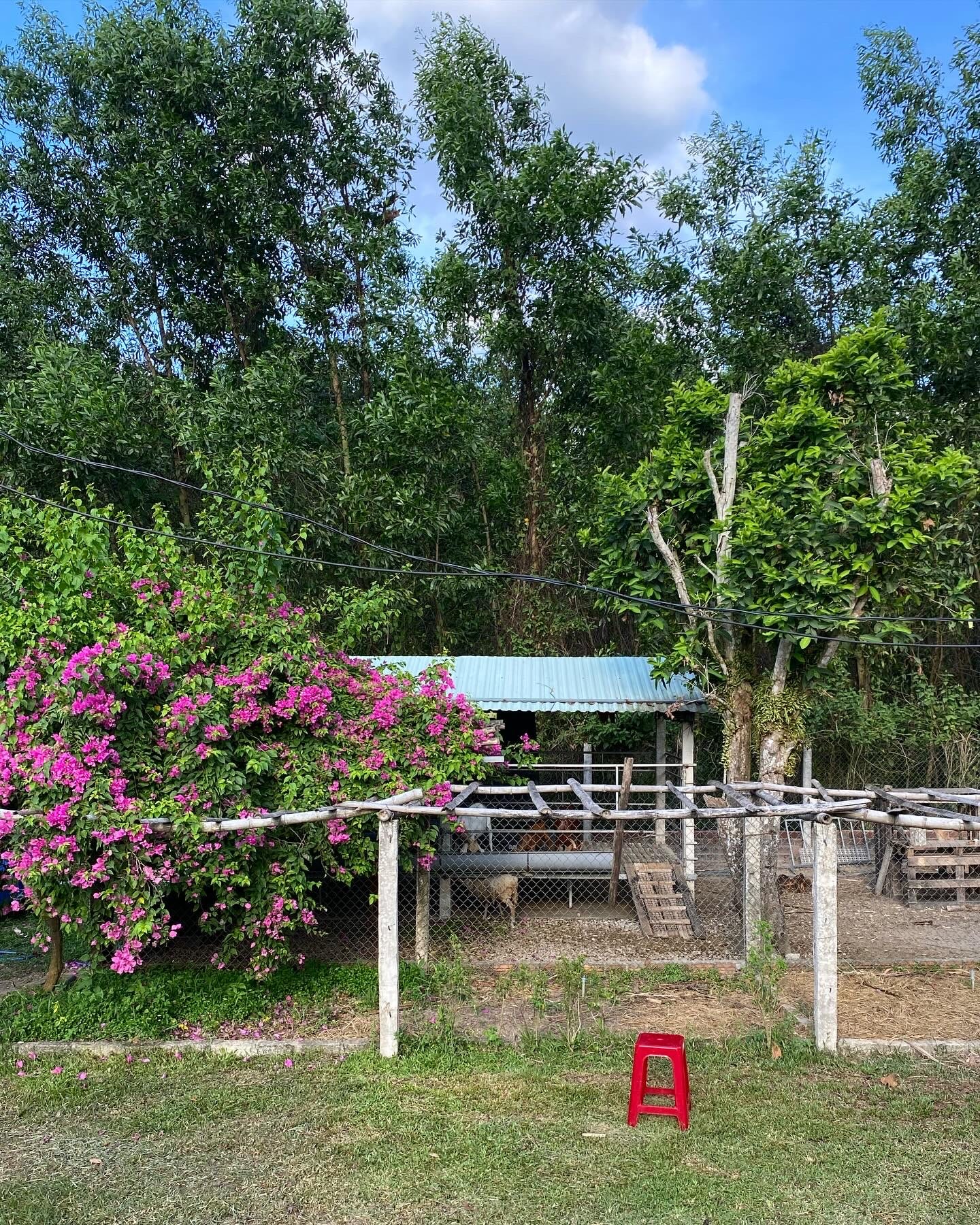Hygge Farm, A Humble Home
There is nothing more grounding than shovelling shit, and watching the sun set.
Despite flying home to the nest, I believe that no story should be left unfinished, so with an essay of notes and a motivation to round off my travels, I have delved into my memory of Hygge Farm to elucidate the shift that I encountered there.
Far away from hair-raising humidity and thirty-five-degree sun, I am grateful to be back, barefoot on cool summer grass, having missed many subtle nuances that the UK has to offer. That being said, like the narrative of a Greek Hero’s journey, I have left, learned, and returned with a satiating experience that will stay with me in everything that I do. Travelling is a chance to shake up your story, challenge yourself, and live life with a multi-faceted perspective. Probably none the wiser, with a much lighter pocket, I have returned with an open eye of the world and too many vintage ceramics that luckily didn’t break in my fish-smelling backpack.
At first, I thought Há was a field worker, wandering around in a baby-blue farming two-piece with a matching hat. He was quiet, humble, and looked no older than 18—petite, with a clean-shaven face. He is, in fact, 32 years old: a qualified veterinarian who has lived and studied all around the world.
He’d felt stuck in veterinary clinics, working long hours while dogs yelped down the corridors. Like many of us, he had a realisation that he didn’t want to spend his life trapped indoors or in an office, working constantly for someone else. So, he decided to return to study and take up agriculture. He spent some time studying in Copenhagen—hence the Danish name of the farm. He returned from his ventures with a world full of knowledge, openness, and many bubbling ideas.
‘Hygge’ is a Danish concept that is difficult to translate directly, but to put it simply, it means cosiness. Hygge is a feeling, and in British culture, it’s the feeling you get stepping through a warmly lit cobbled street or into a stone-walled old pub, waiting for a Sunday roast by a roaring fire. It’s wrapping a blanket around your toes and curling up on the sofa with a hot cup of tea—but it’s also the feeling of comfort and closeness as you gather with friends and family for a barbecue on a warm summer’s day.
At Hygge Farm, that Hygge is found not only in the name, but in the orchestra of birds singing in unison, or in the stillness that settles when a gentle breeze passes through the rice fields. A faint bleat from the sheep in the distance, or the goats screaming for their breakfast if we’re more than one minute late. Hygge Farm is a community project built by Há, determined to bring the world to his village in the awareness that so many wouldn’t ever have the opportunity to do what he did. In the same way, we were there because we wanted to understand the world around us on a more connected level, and have a memorable story to bring back home to those who can’t pursue this venture for themselves. It may even inspire someone else who can to try.
When we arrived at Hygge Farm, we were greeted by Tofu and Zemmie, two young women (19 and 23) who ran the farm from dawn till after dusk. Tirelessly, they rose at 5am to take the cows to the field and didn’t rest until dinner was done around 7 or 8pm. Their energy carried us through each day, bouncing around, making sure everyone was okay. When I first met Zemmie, the young farm manager, she told me how much she loved my hair and asked if I curled it every day. When I told her it was natural, she gasped—she’d never seen anyone with hair like mine before.
On the Sunday we arrived, the farm was particularly busy—twenty children, all around ten years old, darted about playing games. They were here to practise English as most studied English at the local primary school, but had never met a ‘foreigner’ before. Some were shy, some would strut around with confidence, but everyone was curious to say hello. Nam, 10 years old, stood out not for his English necessarily, but for beating all the adults at chess with ruthless precision. He was the King’s Gambit.
Lillie was a little older, there to help her teacher. She must have been about 13, and her English was incredible, yet she always apologised for not knowing enough. Many Vietnamese people often apologised for their mispronunciation, or for not being fluent in their accent, probably because of one anal English-speaker commenting never attempting to remember ‘Bon-jaw’ in their life. This angered me because when people choose not to listen closely enough, it’s because of their ignorance, privilege, and impatience—not because of someone else’s attempt at trying. Besides, with a slight mispronunciation of Cảm ơn (thank you), you can easily be telling someone to shut up in Vietnamese, which I’m sure I’ve done more than once.
What I realised is that, whilst I’m not a qualified tutor, as native English speakers we can offer validation and confidence, and give people the chance to feel proud of their learning. With a little more time, I could offer words in replacement for theories or concepts that Lillie had, and soon she didn’t need her teacher, so for over an hour we spoke about her life in Vietnam.
She was known as her school’s musical talent, and her love for music surpassed every other subject. She loved to sing, and said everyone in Vietnam does—hence the tiny karaoke bars on every corner, and the toneless singing that echoes across the fields every Friday night. Her neighbour once had a routine of waking up to sing at 7am, which luckily became short-lived, as there are still limitations to singing and pissing off your community. In Vietnam, it’s not about how good you are; it’s all about joining in. That’s why I threw away my shame and grabbed the microphone in Ha Giang.
Before arriving at the farm, the luxury of travelling had started to wear thin. Being bussed from place to place with too much freedom of choice had become exhausting, despite its privileges. While travel offers untethered freedoms, it was grounding to settle in one space, with a healthy routine of early mornings and the humble task of scooping poo. Each morning we rotated through different tasks—sometimes cleaning, helping the chef, looking after the cows and pigs, or caring for the chickens and goats. The last quickly became our favourite.
At first, I was slightly terrified of the goats—their large horns and forceful attitude meant they often ran straight at the gate. A few times, they managed to escape, happily gnawing on garden bushes before being herded back into their pen. There was only one mortified-looking sheep in with them, as the other had sadly been killed in a fight by one of the horned goats. Only now do I understand why the surviving sheep looked so perpetually dishevelled and traumatised.
Despite the goats’ microaggressions—refusing to step off your foot, eating their food before you’d even put it down—their brutishness became something I grew fond of. As we cleaned their pen, they became curious. First, there was the tentative lick of a knee, and soon they were always in the way of whatever job you were trying to do. Eventually, I realised they just wanted cuddles. They weren’t just food-obsessed troublemakers after all, but enjoyed nestling up against your thighs as you squatted to scoop the poo in the pen.
Laila, the farm’s lone lady pig, also loved human attention. She’d squeal when she was hungry or wanted a little chat, poking her nose through the fence for a scratch, and snorting happily when she saw you. Sometimes, as we walked away after feeding her, you’d hear her crying until the cows were brought back from the rice fields.
The cows were majestic and beautiful, though at the end of the day, they would huff and stomp their feet when it was time to be led back in. They weren’t really interested in cuddles—only rice plant debris. Still, they would trudge back to their pens with minimal fuss, and always cross into the neighbour’s field for a cheeky chew on the cassava plants.
The calves, however, were a different story. Their training nose rings were still too small to attach a rope, so they would often break free from the herd. I’d be swinging in a hammock near the library when a commotion would start—Tofu would dart through the garden shouting in Vietnamese, and before long, two baby cows would gallop in the opposite direction, making a beeline for the bushes. At the end of every day, they revelled in their frolicking escapades before tucking in for the night.
We learned to make freshly pressed tofu from locally grown soya beans, unexpectedly helped a neighbour build the foundations of a house, and walked every day to fetch a juice or something from the local shop. Everyone in the village would smile and wave, shouting hello, and people passing in large trucks would beep their horns as a welcoming gesture.
Há explained that since opening the farm, the villagers have had more of a zest for business, wanting to monetise from the small influx of foreigners. His neighbours are now juice pressing and coffee-making, and everyone down to the rice growers has felt a small shift from Há starting this project. At first, he was criticised as a madman, but madness soon turns to genius once a plan works; not everyone can foresee a vision such as his. Há said, ‘Not everyone can be a roaring fire, but one person can light a candle.’ It’s in the small things we do that make our lives count, and creating one small light can guide and inspire someone else.
The farm gave me a strong sense of nostalgia, despite being in the depths of rural Vietnam. I realised that for me, peace is where the plants are. It reminded me of gardening with my Nanny Barbara, poking frogs in my back garden after it rained, and the way the clocks slowed down in the countryside. For years, I depended on the city to provide me with a sense of purpose, purchasing and consuming to reimagine how I could change, rather than imagining how a different environment could change me. The truth is, I have come to love both, which has made me more whole; I love the rush of living in a sea of people, and the peace of solitude in the company of birds.
Somehow, I’d found myself knee-deep in shit, filled with hygge. Among other lost (and found) strangers, I had made friends, and the fear of the unknown now falls into the wonder of what could be. Now all I need to do is figure out how to light a figurative candle, rather than lighting a literal cigarette.








Amazing!Loved every moment.So proud of you xx
A fabulous end to a fabulous adventure, I have thoroughly enjoyed reading every bit of it.